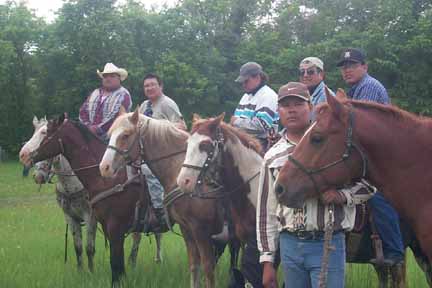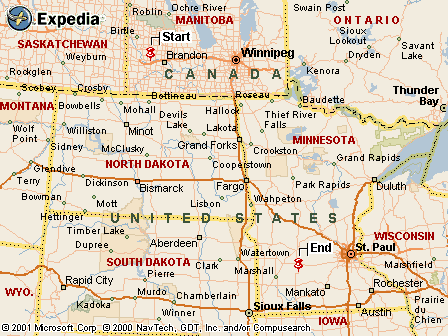|
|
Canku Ota |
|
|
(Many Paths) |
||
|
An Online Newsletter Celebrating Native America |
||
|
June 30, 2001 - Issue 39 |
||
|
|
||
|
Unity Riders trace historic trail |
||
|
by Barb Harvey, Granite Falls-Clarkfield Advocate-Tribune - June 14, 2001 |
||
| Photo Caption: Members of the Sioux Valley and Canupa Wakpa Dakota Reservations in Manitoba arrived in the Horse Rider Campground at the Upper Sioux Agency State Park last Wednesday afternoon, after riding nearly three weeks to participate in their annual Unity Ride to commemorate one of the trails taken by the Dakota people in the 1860s as they fled from the U.S. Army after the Dakota Conflict of 1862. |
 Over
125 years after the Dakota left Minnesota, pursued by the U.S. Army following the Dakota Conflict, a band of Dakota
riders on horseback returned to the birthplace of their ancestors near the Upper Sioux Reservation in southwestern
Minnesota last Wednesday afternoon, riding over a thousand miles over three weeks' time. Over
125 years after the Dakota left Minnesota, pursued by the U.S. Army following the Dakota Conflict, a band of Dakota
riders on horseback returned to the birthplace of their ancestors near the Upper Sioux Reservation in southwestern
Minnesota last Wednesday afternoon, riding over a thousand miles over three weeks' time."We live in Canada, but this is our home," one rider explained. "This is where our families came from and lived until they were forced to leave." Thirteen riders and their horses arrived at the Upper Sioux Agency State Park's Horse Rider Campground early Wednesday afternoon. They were greeted by Tom Ross of the Upper Sioux Community Tribal Council and honored elder Phillip Wright. Following a special sacred ceremony to welcome them and thank the Great Spirit for their safe arrival, the riders began preparations to make camp and took care of their horses, which also were included in the sacred ceremony of honor for their faithful service. A feast in the riders' honor was provided by members of the Upper Sioux Community later that evening. "We've come to get our land back," joked Carl Mazawasicuna, grinning broadly. "We had it first, before you guys showed up." According to rider Billy McKay, a member of the Sioux Valley Band of Dakota in Manitoba, Canada, a Unity Ride is planned each year to commemorate and honor the trails used by their ancestors in their flight to Canada, South Dakota and Wisconsin. The first such ride took place in 1988. McKay, who has ridden in the annual event since 1991, said there are similar unity rides in Canada to mark other trails used by the Dakota during their resettlement there. This year's riders also included members of the Sisseton-Wahpeton Dakota Community of South Dakota, which was one of the stops along their 1,200-mile ride. According to rider Billy McKay, 13 horses and riders left Canada May 19 from Sioux Valley, Manitoba. Most of the riders were from the Sioux Valley and Canupa Wakpa Dakota Reservations in Manitoba, with additional family members driving horse trailers and other support vehicles to accompany them. "This is a renewal of kinship and sharing cultural traditional language and spiritual ties among the Dakota people," McKay said. "It's also a celebration of sobriety and freedom from drugs and alcohol, because none are allowed on the ride." In addition to McKay, other riders included Harold Blacksmith, Gus High Eagle, Bob Bone, Ken Essie, Cody Seaboy, Howard Eagle Seal, Elton Brown, and Phillip High Eagle, Kevin Sutherland (riding this year for the first time) and Carl Mazawasicuna (whose last name means strong or hard man), all of whom rode the entire trip. After a day of rest for both horses and riders Thursday, the group, honored with another sacred ceremony to wish them continued safe journey, left late Friday morning, headed for the Lower Sioux Dakota Reservation in Morton to participate in their annual pow-wow. Joining them on the last leg of their ride was Eunice Wright, daughter of elder Phillip Wright, who provided sacred tobacco and a blanket as a gift in exchange for the use of one of the group's horses for his daughter to ride. According to McKay, the riders planned to drive home Sunday evening following the conclusion of the Lower Sioux Community wacipi, with the horses trailered for a well-earned restful ride home. (see accompanying editorial) |
|
|
|
a Sota Iya Ye Yapi editorial |
| The historical significance of the visit to the Lake Traverse Reservation by the Canadian Dakota horseback riders,
must not be lost. Their Kannawakpa Memorial Ride, from Manitoba in Canada through the Lake Traverse Reservation and onto Morton, Minnesota, does not serve only to help the riders themselves re-connect with their relatives on this side of the international border. It does more. It allows an opportunity for all of the Dakotah Oyate to re-connect to their roots, to who they really are. While talking with the riders, and with Sisseton-Wahpeton Tribal members who turned out to greet them last week, we were told of how vital was their coming together and sharing the experience in the Dakota Language. Families and tiospa broken apart and displaced by war over a hundred years ago came together in this ride. These were their descendants gathering and speaking the words handed down from generations of Dakotah Oyate. These words possess a life force of their own, and are very spiritual. Without knowing the language, which has survived invasion, broken treaties, and displacement lasting many generations, how can one understand the spirit that has the power to reunite Dakota peoples? Fortunately, the Dakota Language has not died. We are informed how glad its speakers are to have been able to share its words, its flow of spirit, with the Canadian riders. This ride may not ever happen again, but the path of re-connection it has opened can surely be followed by all who care about their roots, who care about who they are as Dakota people. |
|
|
||
|
|
||
| Canku Ota is a free Newsletter celebrating Native America, its traditions and accomplishments . We do not provide subscriber or visitor names to anyone. Some articles presented in Canku Ota may contain copyright material. We have received appropriate permissions for republishing any articles. Material appearing here is distributed without profit or monetary gain to those who have expressed an interest. This is in accordance with Title 17 U.S.C. section 107. | ||
|
Canku Ota is a copyright © 2000, 2001 of Vicki Lockard and Paul Barry. |
||
|
|
|
|
|
The "Canku Ota - A Newsletter Celebrating Native America" web site and its design is the |
||
|
Copyright © 1999, 2000, 2001 of Paul C. Barry. |
||
|
All Rights Reserved. |

